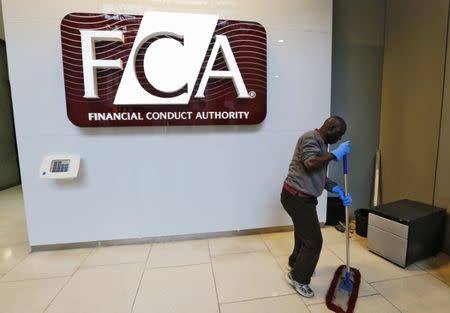FCA seeks to redefine its mission
By Huw Jones LONDON (Reuters) - Britain's financial markets watchdog launched a public consultation on Wednesday asking how far it should go in seeking to protect consumers from market risks in resetting its "mission" and drawing a line under a "very sorry history" of mis-selling scandals that have cost banks billions of pounds. The Financial Conduct Authority (FCA) was launched in 2013 as part of a major overhaul of the regulatory regime in Britain after banks had to rescued by taxpayers in the financial crisis. Since then, misconduct ranging from mis-selling loan repayments insurance to the attempted rigging of interest rate benchmarks and manipulation of foreign currency markets have led to billions of pounds in fines and compensation. "This is a very sorry history, and the future needs to be radically different from the past," the FCA's chief executive, Andrew Bailey, said. The FCA said it wants to draw up a new "mission" statement to help it better manage the supervision of 56,000 firms and 130,000 people with finite resources. "Our mission will set out a framework within which we prioritise our work, ensuring we focus our resource in the right places," Bailey said. The FCA said it did not want to relax the regulatory regime, but wanted to be clearer on what things meant. Announcements that a firm has been 'referred to enforcement' will be made more neutral to avoid a grey area that risks unintended reputational harm if no punishment is ultimately handed down. "When we are investigating, the die has not been cast ... We either take action or not," said Mark Steward, the watchdog's head of enforcement. Since it replaced the Financial Services Authority, the FCA has been trying to find the right balance between consumer protection and not being overly burdensome on firms. The FCA's first chief executive, Martin Wheatley, was ousted by the finance ministry in 2015 for being too aggressive towards financial firms, and replaced with Bailey, who previously headed the Bank of England's Prudential Regulation Authority, which supervises banks. Andrew Tyrie, chairman of parliament's Treasury Select Committee which pushed through changes for tougher supervision after the financial crisis, said the FCA has a responsibility to do much better than its predecessor. The new mission is also an attempt to identify what the FCA cannot reasonably be expected to do, Tyrie said. "And parliament has a responsibility not to make the regulator's job impossible by imposing unreasonably heavy demands on it." Earlier this week, a critical study from think tank New City Agenda, said the FCA risked sleepwalking into the next financial crisis unless it stood up to politicians and stopped watering down rules. Bailey said the report "drags up past history" and was "downright offensive" in describing FCA staff as dobbins, a term for plodding farm horses. The FCA's consultation on defining its mission, lasting until January 26, seeks to determine the right level of consumer protection, whether the focus should be on vulnerable consumers, what role should the FCA play in compensation schemes, and when should the watchdog intervene in unregulated activities. "Will this really change the culture and focus of the FCA? Not necessarily, but it is certainly a good way to get buy-in from the start for any new regime," said Jake Green, a regulatory lawyer at Ashurst. Britain has voted to leave the European Union, which sets most of the rules that the FCA enforces, but Bailey said Brexit won't be a shaper of a mission statement which will be "at the heart of financial conduct regulation whatever we do next". (Reporting by Huw Jones; Editing by Greg Mahlich)

 Yahoo News
Yahoo News 

